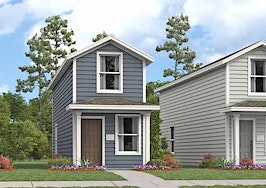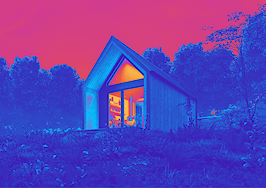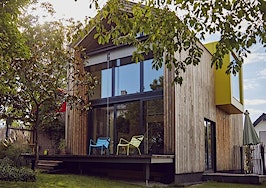The verdict is in — the old way of doing business is over. Join us at Inman Connect New York Jan. 23-25, when together we’ll conquer today’s market challenges and prepare for tomorrow’s opportunities. Defy the market and bet big on your future.
Tiny homes are coming to the Big Apple.
The search for housing in New York City is no joke, but the Department of Housing Preservation & Development (HPD) is providing a boost to homeowners with space to grow on their property through a new program that will grant some select applicants up to $395,000 to construct accessory dwelling units (ADUs) on their properties.
The pilot program dubbed “Plus One ADU,” which the city announced last week, draws on a $2.6 million grant from New York State Homes and Community Renewal (HCR) to help build a little bit more housing throughout all the city’s boroughs. Qualified applicants who are selected will be able to use the funds to build structures like backyard cottages, garage studios, attached in-law suites, basement apartments and attic conversions, HPD’s announcement said.
Through the initial pilot program, by which the city will gauge the level of interest, as many as 15 single-family homeowners will receive grants of up to $395,000 to create ADUs in accordance with existing zoning and building codes in their neighborhood. The city said it will match its own funds received from the state grant to go towards the program.
“Every day, our administration finds new ways to make life a little easier for working-class New Yorkers and give them the tools they need to thrive in this city,” Mayor Eric Adams said in a statement.
“By paving the way for easier, more affordable accessory dwelling unit conversion, we are delivering a tangible win for families. Whether it’s for seniors who need space for a caregiver, a multigenerational household who want separate living spaces, or young parents with a little one on the way, an ADU can offer the flexibility families need to make New York City work for them,” Adams continued. “As a critical piece of our ‘City of Yes’ proposal to build a little more housing in every neighborhood, we are thrilled to welcome the launch of this pilot and see how ADUs can add the housing we need for families across the five boroughs.”
The movement for ADUs as a housing solution gained more traction last month when the U.S. Department of Housing and Urban Development announced a new policy that allows lenders to count income from ADUs when underwriting a mortgage and allows more borrowers to qualify for FHA financing on properties with ADUs.
For New York City residents, the Plus One ADU program will allow homeowners additional space for growing or aging families, as well as access to additional income streams, should they choose to rent out their ADU, all without “significantly changing existing neighborhoods.”
Kendyl Young, an ADU consultant, speaker and educator, noted that many cities with affordable housing problems could benefit from similar programs.
“Any city suffering from a lack of affordable housing can benefit from an ADU grant,” Young told Inman in an email. “ADUs are the fastest, cheapest, and have the lowest negative impact of any new housing.”
But Young added that potential applicants should be sure to look into the details before diving in head-first.
“The biggest thing most people need to know is that the grant program is not an upfront check,” she told Inman. “The process can involve upfront costs that could be reimbursed, verifications of enough funds to start the project, administration costs that will reduce the amount available for ADU construction, and oversight of the project. This may mean restrictions on the actual construction. Also, the applicant should have a clear understanding of rent rules — both as part of the program and in their local area.”
In order to qualify for the program, residents must be owner-occupants and current on their existing mortgages. They can earn up to 165 percent of the area median income, or $186,450 for a two-person household.
Additional requirements as well as the application can be found on HPD’s website. The deadline to apply is Feb. 13, 2024.













